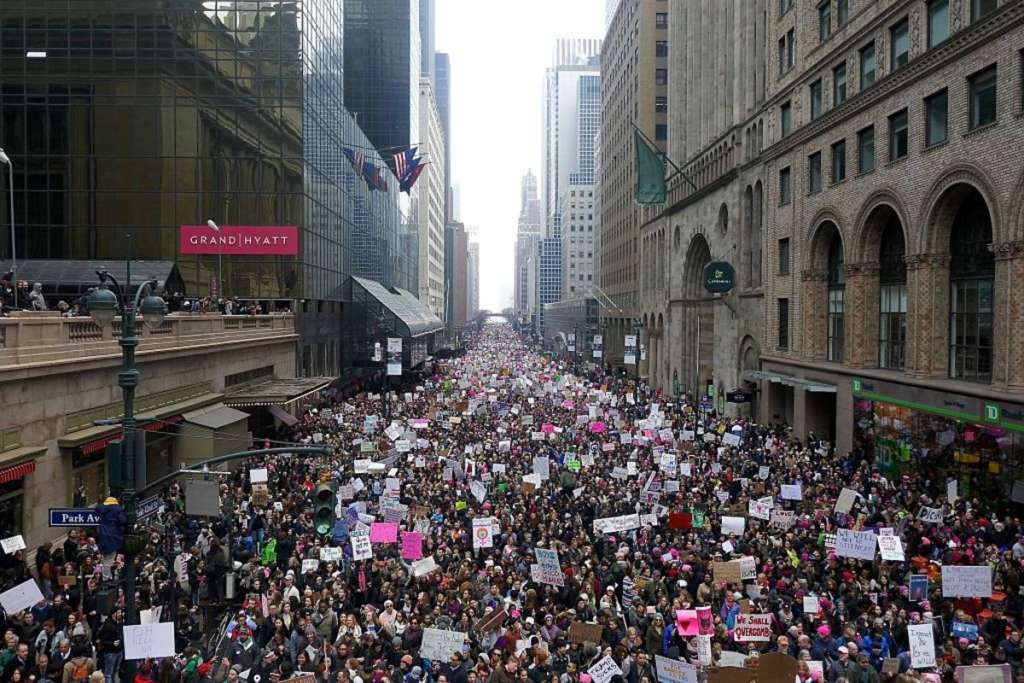When it comes to presidential popularity, perceptions can matter in less-than-intuitive ways. Anything that can affect perceptions might actually make a difference to whether a new president gets his way with Congress and to how his party fares in the midterm elections — even if it is something that, rationally, shouldn’t make any difference.
The easiest argument in the world is to make the case that turnout at either Donald Trump’s inauguration on Friday or at the nationwide demonstrations against him on Saturday just doesn’t matter very much. After all, in either case the number of people is far, far fewer than the numbers who voted for Trump (almost 63 million) or against him (about 74 million, including almost 66 million for Hillary Clinton).
Nor is there any reason to believe that either attendance number predicts future election outcomes. Barack Obama’s record-setting swearing-in ceremony gave way to unpopularity and a Republican landslide in 2010; massive protests against the Vietnam War in 1969 and 1970, the first two years of Richard Nixon’s presidency, didn’t stop him from winning 49 states in 1972.
All that is true. So one might argue that the new president’s reported obsession with the numbers and White House Press Secretary Scott Spicer’s false statements about them are, mendacity aside, just a bunch of silliness.
But that’s not quite all there is to the story.
The national political press will decide how seriously to take organized protests against Trump going forward. In 2009-2010, they chose to take Tea Party protests against Barack Obama very seriously indeed, which in turn probably strengthened those actions and helped to convince members of Congress to treat them as a massive popular movement.
Similarly, the national political press will have to decide whether to portray Trump as generally popular or not, which also may influence the perceptions of members of Congress.
What Trump has going for him, regardless of what polls report, is a natural presumption shared by pretty much everyone that any candidate who manages to have won a presidential election must be popular. That’s such a strong expectation that over the months since November 8 it has sometimes overridden both the plain fact that 3 million more people voted for Clinton and the mediocre or worse numbers on Trump’s popularity and approval ratings of his transition.
It’s the kind of thing that leads a smart analyst, the Upshot’s Nate Cohn, to wonder whether “there’s something about Mr. Trump’s appeal that’s not captured in the traditional approval ratings or the character questions” — something he (and others who have engaged in similar analysis) would never have done had Trump received the exact same number of votes distributed slightly differently, giving him a few more in California and Texas instead of Florida, Pennsylvania, Michigan and Wisconsin.
It’s an atmosphere in which people are going to be searching for evidence to support the seemingly common-sense notion that the winner of the presidential election is popular. So while a relatively small turnout at the inauguration certainly doesn’t provide meaningful evidence (let alone proof) supporting the idea that he’s unpopular, it also fails to provide any support for the idea that the polls are missing something.
And perceived popularity — and the perceived enthusiasm of the opposition — really does matter, and not just on the president’s influence. As congressional elections scholar Gary Jacobson has explained, election expectations can be a self-fulfilling prophesy. A party that anticipates big gains will throw all their resources into the next election cycle.
Even more important is the effect on candidate recruitment. Quality candidates — experienced politicians who know how to run good campaigns — are more likely to run when they believe their party will have national tides in their favor, and in turn those candidates may wind up winning (because they’re good at politics) even if those tides never pan out.
Right now professional politicians are deciding whether to run for U.S. Senate and for governor; soon, candidates will begin deciding on U.S. House contests. The more that Democrats decide Republicans are vulnerable because Trump is unpopular, and the more they detect unusually strong energy among liberal activists and voters, the more tempted they will be to run in 2018, and the better Democrats will wind up doing.
So, sure, the exact number of people who showed up on the National Mall on Friday and the number who marched there and in hundreds of other cities on Saturday isn’t the biggest story. But it’s easy to see why people might want to fight over it anyway.
Bloomberg
